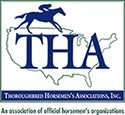
MID-ATLANTIC REGION ENDORSES RULE TO RESTRICT IMPROPER USE OF CLENBUTEROL
By: THA
Posted: Oct. 28, 2020
Continuing a decades-long regional effort to enact uniform medication, safety and welfare reforms, protocols and rules, a coalition of 31 regulatory and stakeholder organizations representing all seven states in the Mid-Atlantic region have unanimously agreed to work together to implement a new rule that will significantly restrict the improper use of the bronchodilator clenbuterol.
Under the current regional rule, clenbuterol may not be administered to a horse within 14 days of a race, and the concentration of the drug in a post-race blood sample may not exceed 140 picograms/ml. The new rule will eliminate the existing testing threshold, require regulatory approval in advance for a horse in racing or training that is prescribed the medication, mandate that the horse be placed on the Veterinarian’s List, and bar the horse from racing until it tests negative in both blood and urine and completes a satisfactory workout observed by a regulatory veterinarian.
The move to restrict the use of clenbuterol in racing was made during a Mid-Atlantic Zoom meeting held Oct. 15. The meeting was attended by more than 60 stakeholder leaders from the seven states and regulatory jurisdictions that have committed to the Mid-Atlantic Strategic Plan to Reduce Equine Fatalities.
During the meeting, New York State Gaming Commission Equine Medical Director Dr. Scott Palmer presented data collected from a recent out-of-competition sampling program. Palmer indicated that the NYSGC required all horses trained by federally indicted individuals to submit to hair testing for prohibited and impermissible substances prior to those horses being allowed to return to racing.
“The commission’s hair testing review found that clenbuterol was administered to a substantial number of these horses without evidence of a medical prescription,” Palmer said. “In addition to being a useful therapeutic medication to treat respiratory disease, clenbuterol has re-partitioning effects that can enhance muscle development. Clenbuterol should not be administered to racehorses without a legitimate treatment plan and a proper diagnosis. This new rule will eliminate the improper use of clenbuterol.”
The Maryland Racing Commission began its rule-making process Oct. 22 and will apply the new clenbuterol rule to both Thoroughbred and Standardbred racehorses. New York plans to propose a rule amendment in November. The other jurisdictions will follow suit, navigating the regulatory process necessary for enactment in each state for racing in 2021.
“The Mid-Atlantic’s collective work has spearheaded significant industry medication reforms over the years, including the bans on steroids in 2008 and, most recently, the use of bisphosphonates in 2019 and thyroid supplementation earlier this year. The region’s Uniform Medication and Drug Testing Program in 2014 ultimately became the National Uniform Medication Program. Everyone in the region, including regulators, racetrack operators, horsemen, breeders and veterinarians, is committed to the implementation of the Strategic Plan to Reduce Equine Fatalities. Working together, we have made, and continue to make, real change,” said Thoroughbred Horsemen’s Association Chairman Alan Foreman, who has facilitated the Mid-Atlantic meetings since their inception.
The new clenbuterol rule is as follows:
- Clenbuterol use is prohibited in racing and training unless the following conditions are met:
a. The prescription for clenbuterol is made for a specific horse based upon a specific diagnosis. The prescription and volume dispensed cannot exceed a treatment period of 30 days.
b. The veterinarian must provide a copy of the prescription and diagnosis to the Equine Medical Director for review and approval. The horse may not receive clenbuterol before this approval is issued.
c. Trainers must make daily notification to the official veterinarian of horse(s) in their custody having been administered clenbuterol. Notification shall be made on a form and by a deadline designated by the Commission.
d. A horse administered clenbuterol shall be placed on the official veterinarian’s list. The horse must meet all conditions for removal from the list including a timed workout and blood and urine sampling. Both samples must have no detectable clenbuterol.
e. A horse may not enter to race until it has completed all the requirements in subdivision (d).
- If a clenbuterol is detected in a horse’s post-race or out of competition sample and appropriate notification as outlined in subdivision 1(a) or (b) was not completed, the horse shall immediately be placed on the Official Veterinarian’s List pending the outcome of an investigation. The horse shall be required to meet all conditions for removal from the veterinarian’s list outlined in subdivision 1(d), above.












